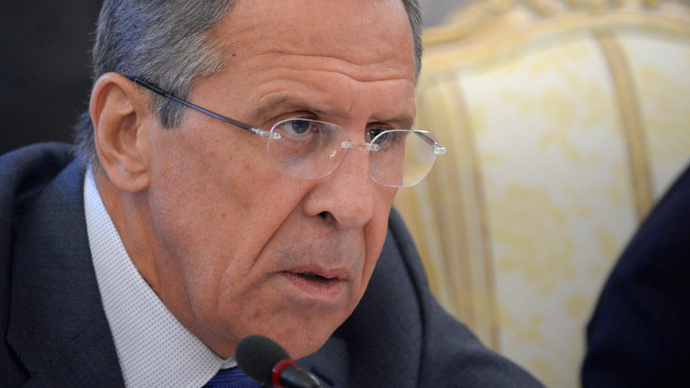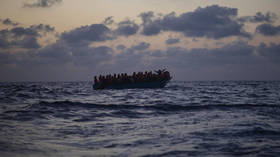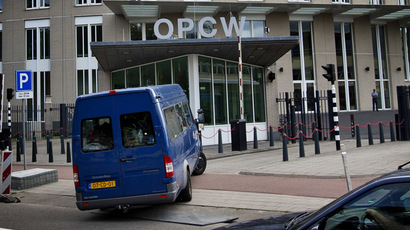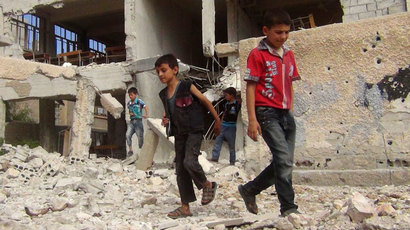Western countries blinded by ‘Assad must go’ mentality - Lavrov

Western countries are more focused on exercising their political dominance than finding a solution to Syria’s chemical weapons crisis, Russian Foreign Minister Sergey Lavrov said in an interview with Russia’s Channel One TV.
Channel One:The Syrian government is reported to have shared with Russia some evidence of the use of sarin gas by the rebels. What kind of evidence is that?
Sergey Lavrov: Earlier this week, my deputy, Sergey Ryabkov, visited Damascus, where he met with the Syrian president, the foreign minister, and experts, as well as opposition activists in Syria who never left the country and are not trying to dictate reforms from abroad.
The data provided by the Syrian side is strictly technical and is
currently being reviewed by our experts. At the very least, it is
an addition to what we and the international community already
know - including independent experts who publish their opinions
and confirm that the opposition resorts to provocations on a
regular basis, trying to have the regime accused of the use of
chemical weapons and through that trying to get external military
support for their own agenda.
Channel One:After the UN mission report was released, France and the US concluded that chemical weapons had been used by the Syrian ruling regime. Russia, however, came to the opposite conclusion. What kind of report is it if it tolerates such conflicting interpretations?
SL: France and the United States never made it a secret
that they had no interest in the report. Long before the report
was produced they said that they have long since known everything
anyway and that their intelligence was beyond reproach – despite
the fact that they never shared it with us in full scope. The
information they did share does not prove the government's
involvement in the chemical attack. There are more testimonies.
Among witnesses are nuns from a nearby Christian monastery, as
well as journalists who visited the sites and talked to the
militants who told them they had obtained some shells from abroad
they had never seen or used before and then eventually they used
them. I’ve repeatedly talked about the letter penned by the CIA
and Pentagon veterans which puts things into perspective. That’s
why it came as no surprise that the report, which only described
the substances and shells the experts saw on the site but
included no identification of who had actually used the weapons,
was immediately interpreted as proof of the regime’s involvement
in the attack by the Americans, the French, and other nations.
That’s absolutely wrong. Such an approach is unprofessional and
unscientific, and it is politically and ideologically charged.

We expect the UN inspectors to go back to Syria because the August 21 incident was followed by three similar toxic gas attacks against the government forces later that week. It is a pity that our Western partners took advantage of the leverage they have with the UN Secretariat leadership by making the experts finish their work prematurely and write a report on the August 21 incident before investigating those three subsequent incidents. But we do hail UN mission leader Ake Sellstrom's statement which says the experts will go back and complete the investigation at the earliest possible date.
Channel One:Carla del Ponte, a member of the UN commission looking into human rights violations, has said that the rebels could have used chemical weapons. Her claim has been supported by the CIA veterans, by a number of independent experts, and even by the disillusioned deserters from the rebel ranks. So why does the West appear to be unwilling to hear this voice of reason? Supposing Bashar Assad does quit, this will mean the militants will come to power. And the latest reports confirm that these militants are mostly radical Islamists. Who would benefit from this?
SL: Our partners are currently fixated on the ideological
task to have the regime replaced because a couple of years ago
they made a statement that President Bashar Assad had no future
whatsoever except to quit and leave. Today they are facing the
necessity to acknowledge that they were mistaken – the same way
they were mistaken in case of Libya when they bombed the country
and drove it to a collapse; the same way they were mistaken in
the case of Iraq where they did the same and on top of that ran a
land operation and left the country in a critical state, with
dozens of people dying every day at the hands of terrorists. No
one cares to recall these facts. Everyone is too busy saying that
Bashar Assad has to go. They simply choose not to talk about how
a chain of their actions led to a catastrophe in the region.
I am sure that the nations of the West did so in order to prove
that the Middle East will “dance to their tune.” This is a
strictly political agenda. They are first and foremost interested
in establishing their dominance – and not at all in the task
we’re interested in which is finding a solution to the chemical
weapons issue in Syria. If this were their primary interest too,
they would not be doing what they are doing, for instance, in the
UN Security Council. They didn’t even care for the implementation
of the very first action on the action plan that we mutually
agreed with US State Secretary John Kerry - this action being
having the Executive Council of the Organization for the
Prohibition of Chemical Weapons to make a relevant decision.
Ignoring this, they are urging the UN Security Council to make a
decision invoking Chapter 7 of the UN Charter, and it just has to
be Chapter 7, mind you. That’s what they are concerned about most
of all. They want Chapter 7, which stipulates the possibility to
put pressure on the breachers of international law through
sanctions and even through the application of force. That’s all
they want, since obviously if they wanted to take care of the
chemical weapons situation they would be following the plan we
have agreed - i.e. focusing their efforts on obtaining the
Organization for the Prohibition of Chemical Weapons (OPCW)
decision.

Our American partners are blackmailing us, saying that if Russia refuses to vote in the UN Security Council for the resolution invoking Chapter 7, the US will stop cooperating on producing the OPCW decision in The Hague. This is completely the opposite to what we have agreed with State Secretary John Kerry – which was that the OPCW decision has to be produced first, and only after that the UN Security Council would follow up by adopting a resolution in support of this OPCW decision, and this supporting resolution would not be invoking Chapter 7 of the UN Charter.
Channel One:According to Western media, your successful negotiation with John Kerry has strengthened the role of Russia in the Middle East settlement process, to the level Russia enjoyed back in the 1970s. It is clear now that the West is trying to turn the situation to their advantage and pull apart Russia’s success. What would be the course of action for Moscow should the UN Security Council pass a tough resolution on Syria?
SL: The UN Security Council can just as well pass a tough
resolution in support of the decision made by the Organization
for the Prohibition of Chemical Weapons, but this resolution will
not invoke Chapter 7 of the Charter, and therefore will not give
a green light to any military action against Syria that some
parties have in their mind.
It is hard for me to understand what is going on in the West
right now. I am genuinely surprised at how light-heartedly our
Western partners are tossing aside the unique opportunity to
solve the chemical weapons issue in Syria now that President
Assad’s regime has officially joined the Chemical Weapons
Convention and is ready to comply with all the obligations under
it fully and immediately, without claiming the 30-day timeframe
allowed by the Convention. And, as confirmed by the Syrian
authorities during the visit of my Deputy Sergey Ryabkov to
Damascus recently, the Syrian government is also ready to
disclose all the information about the amount, type, whereabouts
and other details of the chemical weapons in its possession. I
believe that is irresponsible and unprofessional under such
circumstances to focus all the efforts on trying to get some
politicized agenda approved by the Security Council instead of
focusing them on the real professional work. They want the
Security Council to do more than simply support the OPCW
decision. They want to throw in a number of other issues such as
human rights and International Criminal Court issues, and others.
Instead of viewing the Russian-American agreement as the
opportunity to rid the planet of a significant arsenal of
chemical weapons in Syria’s possession, they view it as the
opportunity to try and achieve what Russia and China have
consistently denied them to do, namely to force through a
resolution allowing the application of force, condemning the
regime and freeing the opposition from all blame – instead
putting all blame on Bashar Assad - and getting a green light for
the scenarios involving the application of force. The outcome of
these scenarios, if implemented, as you correctly pointed out,
will be in favor of the militants who will seize power, and it
will be the end to a secular state. At least two-thirds or
three-quarters of these guys are jihadists. Some of them are
really extreme such as Jabhat al-Nusra, the Islamic State of Iraq
and the Levant, and a whole number of others whose purpose is to
establish an Islamic caliphate in Syria and adjacent territories.
If our Western partners can think at least a couple of moves
ahead, there is no way they don’t understand this.

Channel One:We already have a “LibyanJamaat,” a highly unstable Egypt, and a turbulent Islamized Tunisia. Why would the West need all this? They can’t help seeing what it all ends up with.
SL: It’s hard for me to answer this question. Russian President Putin keeps asking this question whenever he talks with his US or European partners, but so far we have never heard a clear answer to it. We hear a lot of mantras about promoting democracy and protecting human rights, but these are not the only things that mature policy-makers should take into account. It is certainly important to ensure the observation of civil rights and freedoms; however, not to ensure stability in this key region of the world is simply irresponsible. Completely irresponsible.
Analysts have been trying hard to get to the point behind all this. There was a hypothesis that someone is trying to generate a controllable chaos and “catch some good fish in muddy water.” I don’t see any real benefits for the Western countries in doing so, even if we suppose they did it. What we’re dealing with here is rather an attempt to “grasp at straws,” to try and ignore the fact that the world is changing and evolving into a multi-polar world. Today it doesn’t work anymore to impose one’s rules onto others, the way it worked a few centuries ago - what works today is to make collective decisions. It is no coincidence that the UN Charter defines the UN as the organization that is the center for the collective actions of all nations. So let us act this way instead of imposing one’s rules onto other civilizations, especially since these rules are not always and not by everyone perceived as good.
Channel One:If we could get back to the chemical weapons issue. Damascus issued a statement that it needs one billion US dollars and one year of time to destroy all the chemical weapons in stock. It also confirmed its readiness to hand chemical weapons to any nation that will take up the risk to accept it and destroy it on its territory. Is there a road map for this chemical weapons disposal program? Technically, how will it be implemented?
SL: We had security, military, and chemical experts with us in Geneva during the talks with US State Secretary John Kerry and his delegation. The proposals that we have agreed and that are currently being reviewed by the OPCW contain a professional assessment of all key milestones of the works to be done. Naturally, it is now the OPCW’s task to refine them and capture them in a legally binding form, which is exactly what the OPCW is doing now. We and our American colleagues are currently drafting the OPCW decisions. Some issues are yet to be finalized in order to ensure compliance with the Chemical Weapons Convention. Among them is immediate and unhindered access to the locations designated as the locations of chemical weapons storage facilities, and a number of other issues. I believe that these can be easily agreed and the decision can be expected fairly soon, unless of course, the arrogant position of some of our Western partners threatening to cease cooperation within the OPCW framework if the UN Security Council fails to pass a resolution on Syria invoking Chapter 7 prevails. If this were to happen, it would expose their true intentions about the Syrian crisis.
I am aware of the one billion US dollar assessment voiced by the Syrians. We discussed the potential cost of this program with our American partners in Geneva, and the numbers we talked about were significantly smaller - therefore it needs an expert evaluation. It will become clear after the OPCW experts have reviewed the chemical weapons arsenal in Syria and decided what can be destroyed on site (this is a considered possibility) using mobile destruction facilities that can be provided by a number of countries, and what will call for the construction of special destruction facilities of the kind we built to destroy the USSR’s stock of chemical weapons. Also, a special permission will be required in order to move part of the hazardous substances outside Syria since the Convention stipulates for the destruction of chemical weapons to only take place on the territory of the country in possession of it. To achieve this, we’ll have to look for legal solutions, but if all parties agree in principle, there should be no problem capturing it in legal terms.
Channel One:Are we to expect some sort of an international military presence in Syria in connection to all this?
SL: No, this isn’t part of the plan. There is an understanding that a group of OPCW experts, enhanced by external additional experts with proper expertise if necessary, will take the chemical weapons arsenals under their control and process them at their storage facilities that will be identified and confirmed in cooperation with the Syrian government. Syrian and international experts will carry out the required procedures to prepare chemical agents and chemical weapons for destruction.

Of course, we need to address the issue of ensuring their safety. We put forward a proposal that it may be possible to set up an internationally secured perimeter around the areas where the experts will work. We are ready to send in our military and military police to fulfill this task. I don’t think there is any need for significant international military presence there. I believe it will be sufficient to have a military observer force deployed. We need to ensure that all the permanent member states of the UN Security Council, as well as Arab states and Turkey, are represented on the international observer force in order to send the message to all the conflicting parties inside Syria and that the observers represent all of the external forces cooperating with all the parties in the Syrian conflict in order to discourage any provocations. I would also like to emphasize that according to the Russian-American agreement, Syria as the sovereign state in charge of its territory will bear the main bulk of responsibility for ensuring the security and safety in general and of chemical weapons experts in particular. During the [Geneva] meeting, we also emphasized that other Syrian parties, i.e. the opposition, are also liable for maintaining a threat-free environment for the international experts to work in. And those who have nurtured this opposition and keep encouraging them and covering for them – these parties must feel that it is their responsibility to ensure that the opposition groups attempt no provocations towards the international experts.
Channel One:According to Israeli experts, the rebels took control over the areas with chemical weapons facilities at least twice and may have gotten hold of it. Also, it is possible that the sarin came from outside Syria. As we all know, two Jabhat al-Nusra members attempted to smuggle some containers with sarin via Turkey. How can the international community implement control over the chemical agents possessed by multiple rebel groups?
SL: The decisions the OPCW is developing now stipulate that the entire arsenal of chemical weapons in Syria has to be placed under control and ultimately disposed of. When our Western partners keep saying all over again that only the regime has weapons in its possession and therefore no one else could have used them, and that the opposition has no chemical weapons whatsoever, they are not being honest. This is also confirmed by the Israeli reports you just referred to. In our opinion, the likelihood is high that this data published by the Israeli experts is true, in addition to the fact that the rebels are likely to be trying to “cook” their own hazardous and poisonous agents in their primitive labs. And it is critical that as part of the effort for the OPCW experts to place chemical weapons storage facilities under control, those who finance and support the opposition groups - including the extremists - would find a way to have them turn in the weapons they got hold of as they need to be destroyed in line with the Chemical Weapons Convention.
Channel One:Aren’t you concerned that the timeframes for chemical weapons disposal announced by Russia and Damascus are a bit unrealistic, as the Western experts say? Moscow has practically become the guarantor of chemical disarmament, yet the West insists that the timeframes are not feasible.
SL: You know, the timeframes have been agreed with our
American colleagues in Geneva. Most of the milestones such as
deadlines, periods, and start and end dates were proposed by the
Americans. I would like to point out that we are in no way a
guarantor of chemical disarmament in Syria. We ensured that Syria
acceded to the Chemical Weapons Convention under no preconditions
– whereas the United States had acceded to the Chemical Weapons
Convention with stipulations. Now Syria is a party to this
legally binding document and therefore the guarantor of Syria’s
compliance with the Convention is no other than the entire
international community. In this case, it is the Organization for
the Prohibition of Chemical Weapons.

Channel One:On the way to Geneva, did you have a feeling of whether Washington is ready or willing to hear what you want to say?
SL: I didn’t think of it. All I thought of was that we had our position that allowed for many things to be agreed and negotiated within its scope, but we’d never agree to re-define its scope. As a professional, I was pleased that we succeeded in maintaining our position. And we did it not by bluntly ignoring the US position, but through an active search for a solution within the scope of our position. Through a search for compromise approaches that would rely on the letter of the Chemical Weapons Convention and be free of the ideologically and politically charged agenda.
Channel One:What caused the heaviest disputes in Geneva and proved to be the hardest of all to negotiate? I understand it was a checks and balances system.
SL: It’s difficult to say. In a nutshell, the Americans were very eager for us to undertake the obligation to vote for the UN Security Council resolution invoking Chapter 7 of the UN Charter, regardless of the decision made by the OPCW – which would be putting the cart before the horse. At the end of the day, professional approach prevailed over the politically charged one stipulating that the OPCW experts would first produce their decision and a plan detailing all the procedures required to place chemical weapons in Syria under control and eventually dispose of it, after which the UN Security Council will support this decision and implement additional measures, such as, for instance, providing additional experts that the OPCW doesn’t have, or establish the secure perimeter. This is all the UN Security Council should do based on the guidelines we expect UN Secretary-General Ban Ki-moon to produce.
Right now, our Western partners are trying to force through a resolution invoking Chapter 7 prior to obtaining the UN Secretary-General’s guidelines. They are nervous, as they understand well that the very mention of Chapter 7 means a chance for some validation for the unilateral actions they have in mind with the Security Council. Our advice to them would be to stay calm and stick to the international law - i.e. the Chemical Weapons Convention - instead of inventing resolutions that actually push the Convention into the background while putting forward their personal or geopolitical and national ambitions.
Channel One:Chemical disarmament in Syria doesn’t mean the end of the Syrian conflict. Is there an action plan to follow the chemical disarmament plan and eventually put an end to the war?
SL: The key thing is to follow through the political
settlement. There is a foundational document that can ensure it -
i.e. the Geneva Communiqué of 30 June 2012 which was signed by
all the UN Security Council permanent member states, the League
of Arab States nations, Turkey, the EU, and the UN which is
currently considered by all as the only possible foundation for
settlement. At the time the Geneva Communiqué was being
negotiated, our Western partners tried to have this document
capture an obligation for all the involved parties to pass a UN
Security Council resolution invoking Chapter 7, and to demand
that President Assad resign. Eventually, these proposals were not
included. Russia, China, and a number of other nations saw
clearly the completely unrealistic nature and an unhealthy
fixation on the unilateral interests of such proposals. The
Communiqué calls on both the government and the opposition to
achieve agreement and establish a transitional governing body
that will have the full executive power for the period required
to prepare the new Constitution, new elections, etc.

But it is paramount that this should be done based on a mutual agreement. When we presented the Geneva Communiqué to the UN Security Council exactly the way it had been approved by all signing parties, the US partners said, “It’s okay but we need to add to it that we invoke Chapter 7 and demand Bashar Assad to go under it.” It’s the same story all over again now. Right now, we have another document fully agreed in Geneva with no mention of Chapter 7. And again, attempts are being made to change this and rewrite the document to link it up to Chapter 7.
You see, we are open for negotiations. We are trying hard to always be. No one can say we don’t stay true to our commitments. It is true that sometimes we do not budge, but we refuse to budge only where we see obvious attempts to violate the international law. And once we have committed to something, we stand by it. And it is very sad that our partners sometimes do not reciprocate.














